
Imphal: As living rooms in India were being invaded by live telecasts of 74-year old Gandhian and anti-corruption campaigner Anna Hazare's arrest, release and subsequent refusal to leave jail in New Delhi, a reticent poet was being produced for a similar campaign before a Central Judicial Magistrate (CJM) court here in Imphal, around 2,500km away from the national capital. Imphal is the capital city of the northeastern Indian state of Manipur, situated on the Indo-Myanmar border.
There were no camera lights, no shouting protestors, no live telecast for 38-year old Irom Sharmila Chanu who been fasting for ten years now for the total repeal of the controversial Armed Forces Special Powers Act 1958 (AFSPA), which gives India's armed forces the power to arrest, search, and destroy property without warrant as well as to shoot, and even kill, on mere suspicion.
Chanu, often called the Iron Lady of Manipur, has been on a fast-unto-death since November 4, 2000 after paramilitary personnel shot dead 10 civilians at a bus stand in apparent retaliation against an ambush by underground insurgent groups earlier in the day. Only a few rights activists and women vigilante members were with her at that time.
Three days later she was arrested on charges of attempting suicide. Since then she has been under police guard in a secluded ward of the state hospital and force-fed through a nasal pipe to keep her alive.
Regular arrest
As IPC section 309 under which she was booked can imprison a person for only a year, Chanu is regularly released and re-arrested every year as she refuses to break her fast even after all these years. She is also produced before the court every 15 days.
Manipur, once an independent kingdom, has around 40 underground outfits engaged in an armed struggle for political autonomy and restoration of lost sovereignty.
The government has responded with counter-insurgency operations and AFSPA was enforced in Manipur in 1980. The Act is also in force in the northeastern states of Arunachal Pradesh, Assam, Meghalaya, Mizoram, Nagaland, and Tripura as well as in Jammu and Kashmir.
Many blame the Act for a series of massacre, rape and extra-judicial killings in the state. According to media reports as many as 235 people were killed in the Manipur conflict between January and April 2009, while 75 were killed in 2010. Many of them were alleged to be "fake encounters".
Equal rights
"If you think about it, both campaigns are for similar causes. Anna wants that all should be equal under law, even the Prime Minister. Chanu also wants that the government and its army should function under the framework of a rule of law," says human rights activist Babloo Loitongbam who has been solidly backing Chanu's decade-old campaign.
"After four days of Anna's fast, the country's parliament shook, but why are they neglecting the ten-year old fast of Chanu?" he asks.
One of the state's women vigilante member Leibaktombi adds, "If a Delhi person was fasting instead of Chanu, the Act would have been removed. The Centre's neglect of the issue shows that they disrespect the people of Manipur and its women." Songwriter, singer and activist Akhu Chingangbam is based in Delhi, but his heart is in Manipur. Throughout my music career, Iche Sharmila has been a constant theme."
He has been actively engaged with other student activists in organising support campaigns for Chanu and against AFSPA in the college campuses of Delhi and at Jantar Mantar over the last few years.
"Everytime we call the media houses here they never come. Those few that come conduct interviews, ask why we are doing this, but the stories will never appear on TV or in the newspapers," he said.
"I think the media or the people in the rest of India don't care because it [AFSPA] doesn't affect them; what kind of life we live is not important to them," he adds. Like Anna, Chanu too had taken her protest to Delhi's Jantar Mantar in October 2006. At that time, many activists and students, including Nobel Peace Prize winner Shirin Ebadi had come to support her. "Some concerned media persons and media houses came to interview her and write the story of Manipur's struggle against a law that threatens one of the fundamental rights enshrined in the Constitution of India— the Right to Life," says Babloo.
"I think Sharmila's campaign too would have been recognised by the government if she was protesting in New Delhi," he adds.












